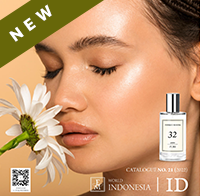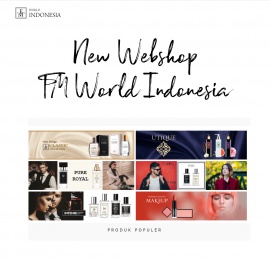We answer your fragrance questions!
-
Who is a Nose?
-
Nose is a person, a perfumer – someone who invents fragrances but is not always directly involved in its physical creation (done by chemists). A person who is a Nose can distinguish and name thousands of scents. However, a Nose at his work relies not only on his senses but his memory and imagination. Industry people say that before the scent is created, the Perfumer dreams it. The art of perfume creation is all about evoking emotions and bringing back memories.
-
What is Sillage?
-
Silage (pronounced as see-yazh) comes from French and means a ‘wake’. Like a plane crossing the sky and leaving a trail, the wearer of perfume can also leave one. Have you ever entered the room and recognized the presence of someone by the scent he/she left behind? When you choose your fragrance, think whether you want one with strong or light sillage. But remember, sillage has nothing to do with fragrance concentration, but rather with nature of the ingredients used.
-
What are “notes” in perfume?
-
Much like in the music composition, in the perfume world we use notes to describe scents. Notes usually describe a single scent – like a rose note, but can also refer to a mix of different ingredients which are perceived as one scent – ex. green notes or leather notes. Notes are divided based on their evaporation time. First come head notes, followed by the heart notes and the longest lasting base notes.
-
What is the meaning of the word ‘perfume’?
-
Perfume comes from a Latin word ‘per fumus’ which means ‘through smoke’.
-
What is aldehyde?
-
Aldehyde is an organic compound reproduced in the laboratory. Naturally it can occur in some citrus. Aldehyde is characterized by soapy, lemony, waxy scent and has been widely popularized in the perfume industry through its use in Chanel No 5. It is believed that it is thank to the aldehyde, Chanel No 5 is so indisputably unforgettable.
-
What are Fragrance Families?
-
Fragrance families are modern way of classification of perfume. We group fragrances according to their notes – e.g. floral – with flower notes, citrus – with lemon, mandarin or grapefruit, woody – with sandalwood, cedar or patchouli, water – with sea accords etc. Use Federico Mahora Fragrance Wheel to find your favorite scent!
-
What is Chypre? What is Fougere?
-
Chypre is a scent characterized by combination of citrus, oak moss and patchouli. It is fresh and aromatic. Fougere means fern and it is a way to describe men’s scent which is usually made of bergamot, lavender, oak moss and tonka bean / coumarin (smells like a fresh hay). While we tend to love some fragrances and really dislike the others, it’s good to know which fragrance family is your favorite one.
-
What is the difference between EDP and Parfum?
-
The difference is in the fragrance concentration. EDP means Eau de Parfum and has about 12-15% of perfume oil inside. Whereas Parfum, has about 15-30%. Most fragrances sold nowadays in the stores are EDT – Eau de Toilette with about 9-10% of fragrance concentration. Federico Mahora Fragrances have a higher than usual concentration with our EDP having 16% and Parfum – 20% of fragrance oil.
-
Are perfume created from natural ingredients better than perfume created using synthetic ones?
-
Nowadays almost all perfume on the market are made from synthetic ingredients recreated in the lab. Even the biggest fragrance houses use synthetics and only the three biggest global brands are believed to use natural ones, but still only in the marginal proportion (ca. 20% of composition). Why is that? Science and technology dramatically changed the perfume industry. Right now, almost every identified scent can be recreated in the lab. Moreover, synthetic notes are more stable and longer lasting. When using synthetic ingredients, perfumers can be sure that every bottle of the created fragrance will be the same. And for the companies – they avoid the uncertainty related to volatile supply of raw materials.
-
How to create a fragrance?
-
Perfume creation is a long lasting process. It starts with a brief – which defines the personality of a future wearer, name of perfume and its packaging. Then the scent is physically created – usually in a few samples, which are being tested and evaluated. The winning formula is approved by the client and launched to the market. FM Group works with the best perfumers of Drom Fragrances® - international fragrance house based in Germany.
-
What are the ingredients of perfume?
-
Depending on the type (EDT, EDP or Parfum), fragrance contains from 7-30% of essential oils. The rest of the composition is water and alcohol.
-
On which occasion should I wear perfume? Can I use perfume every day?
-
It is appropriate to use perfume almost anytime (except of when you plan to exercise or sunbath). Smelling good can be just a part of your daily hygiene. Therefore, don’t be afraid to use it on a daily basis. If you don’t want to attract too much attention you can use fragrance that is delicate –e.g. floral scents or with lower fragrance concentration (EDP instead of Parfum). For special occasion, you can use something more intense – e.g. oriental or woody scent.
-
Where should I apply perfume, on my skin or on my clothes?
-
You can do both ways. Usually, perfume should be applied on such body parts as you neck, your wrists and inside the elbows – where the pulse points are located. However, if you really love the scent and want it to last longer, you can also spray a bit on your clothes – just make sure you keep the distance while spraying – from about 20 cm away so it does not stain your clothes.
-
Why is the scent different when I first apply and later?
-
Every fragrance has its life. That means that the scent evolves and goes through different stages until it disappears completely. When you first apply perfume, you smell the top notes mixed with alcohol. When the alcohol evaporates, the essence of fragrance appears – normally after several minutes. This phase will last for few hours. In the end you smell only the base notes. In addition, perception of scent depends also on the environment, humidity and temperature. That’s why it may smell different in the store when you first try it and later when you go back home.
-
How to store perfume?
-
To make your bottle of perfume last as long as possible, you should store it in the dry, cool place. Also make sure you keep it away from the direct sunlight. If you want to carry your bottle in your purse, buy perfume in smaller capacity.
-
Is perfume appropriate for Muslims?
-
Certainly. There are many arguments for using perfume by Muslim. First, Islam puts high emphasize on personal hygiene and perfume can be used as a part of daily grooming routine. In addition, Muslim countries of the Middle East are originally home to perfume creation. Finally, at FM group, we use Alcohol Denat in the fragrance composition. Alcohol denat (denatured alcohol - for external use only) is commonly used as solvent in the fragrance and cosmetics industry. It is not suitable to drink and its chemical composition is different than ethanol alcohol (which is drinkable and intoxicating). According to many Muslim leaders if the alcohol is synthetic (not coming from natural ingredients) and used as solvent, it is pure and permissible to use (it is halal).
-
Can using perfume affect my mood?
-
Certainly! Everybody knows the healing effects of aromatherapy. Perfume work in the same way – they can uplift our mood, make us feel confident and happy. What is more – they can also affect people around us – we all like to spend time with people who in our opinion smell good.
-
What type of perfume is most appropriate for me?
-
Choosing a fragrance is a difficult task. Here are some tips to make it easier. First, you can choose based on the fragrance families or notes. If you like sweet fruity scents, we can search for floral / fruity fragrances. If you like vanilla or sandalwood, you should try oriental scents. Secondly, you can think of type of perfume which can be associated with our personality or lifestyle – extravagant, classic or elegant, sporty or maybe business. Sometimes, choosing a fragrance is also the result of our mood – whether we feel like wearing something discreet or maybe with stronger sillage. Use our tools: Fragrance wheel + Manual Fragrance Notes Mini guide
-
Can scent influence my behavior?
-
According to some scientific experiments scents can trigger certain reactions from people. Such information is used for instance by retailers who scent the shops interior to boost sales or drive specific consumer behavior – a term coined as ‘retail therapy’! Based on some research, the scent of cinnamon can drive consumer to make more shopping and spend more money on premium goods! All in all, how we behave when smelling different scents is related to how scent activate different parts of our brain and make us feel good or bad. Also, don’t forget that scent can be an aphrodisiac. Isn’t fragrance a powerful tool than?






